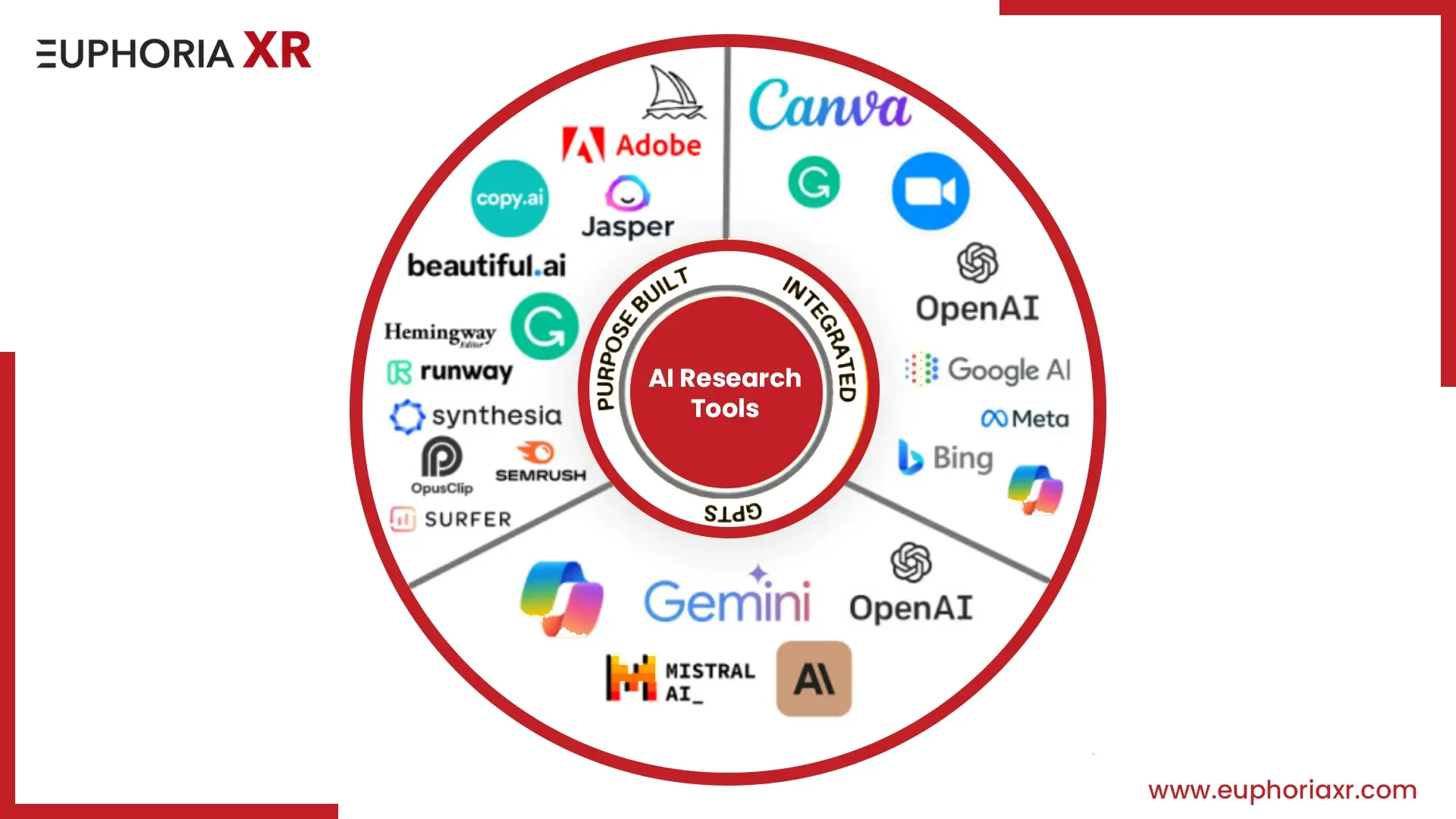Artificial Intelligence (AI) tools are revolutionizing research by automating tasks, improving data analysis, and generating insights faster than ever. Whether you’re conducting scientific research, writing academic papers, or analyzing massive datasets, the best AI tools for research can significantly enhance your efficiency and productivity.
The artificial intelligence market surpassed $184 billion in 2024, reflecting a notable growth of almost $50 billion compared to the prior year. This rapid growth is projected to continue, with the market expected to exceed $826 billion by 2030.
In this blog, we will explain what AI tools are, outline eight key benefits, and showcase the best AI tools for business and research, including both free and paid options.
What Are AI Tools?
AI tools are software applications that use artificial intelligence technologies— such as machine learning, natural language processing (NLP), and deep learning, to perform tasks like data analysis, predictive modeling, and writing assistance. These tools automate processes that would normally take a lot of human effort, helping to improve speed and accuracy in research, business, and academic work.
Key Benefits of Artificial Intelligence (AI) Research Tools
Time Efficiency: AI tools automate repetitive and time-consuming tasks, saving valuable time for critical research.
Enhanced Accuracy: Minimized human error leads to more accurate results, especially for data analysis and complex computations.
Data-Driven Insights: AI tools analyze vast datasets quickly, providing insights that might otherwise be missed.
Collaboration: Many AI tools offer collaboration features, enabling teams to work.
Scalability: Ideal for handling large datasets and complex projects, especially in research and business.
Customization: Personalized AI models and algorithms can meet specific project needs, making research more effective.
Affordability: Free AI tools for research make AI accessible to researchers at all levels.
Innovation: AI enables creative problem-solving, offering new ways to tackle complex challenges.
Top 10 AI Tools for Research
1. OpenAI’s GPT-4 (ChatGPT)
ChatGPT is an advanced conversational AI tool powered by OpenAI’s GPT-4 language model. Known for generating high-quality text, it can be used for writing research papers, answering complex questions, or even generating code, making it one of the best AI tools for research.
Benefits:
Generates content, summaries, and even code.
Adapts to the user’s input for customized responses.
Easy to use for researchers and non-technical users alike.
Drafting research papers.
Brainstorming ideas for academic or business projects.
Simplifying complex concepts for better understanding.
Cost: Free (basic version), Paid (Pro version).
2. Zotero
Zotero is a free, open-source tool for managing references and citations, making it a must-have for researchers. It organizes and formats citations automatically and integrates with word processors for smooth writing.
Benefits:
Automatically generates and formats citations and bibliographies.
Organizes research materials in a central library.
Works with applications such as Microsoft Word and Google Docs.
Managing research references.
Organizing academic articles.
Collaborating on bibliographies and research papers.
Cost: Free.
Transform your business by collaborating with an AI Development Company. We offer customized AI solutions for machine learning models and automation tools to streamline operations and improve decision-making. Contact Us today for a consultation.
3. DeepMind’s AlphaFold
AlphaFold, developed by DeepMind, has transformed the biological research field by accurately predicting 3D protein structures. It’s a valuable tool for life science researchers, particularly in the areas of drug discovery and disease understanding.
Benefits:
Accurately predicts protein structures, aiding drug discovery.
Minimizes the time and resources required for protein analysis.
Free for academic use.
Drug discovery and molecular research.
Biological and biochemical research.
Cost: Free for academic use.
4. IBM Watson Studio
IBM Watson Studio is a robust AI platform that enables researchers to build, train, and deploy machine learning models. This tool is great for large-scale data projects and collaborative work, making it one of the best AI tools for business as well.
Benefits:
A complete platform for data analysis, model building, and deployment.
Supports collaboration for research teams.
Automates machine learning processes, reducing manual coding.
Developing machine learning models.
Automating data analysis for research and business.
Collaborating on AI-driven projects.
Cost: Free tier available; Paid for advanced features.
5. Jupyter Notebooks
Jupyter Notebooks is a free, interactive platform that allows researchers to write and run code in programming languages such as Python and R. It allows live code execution, data visualization, and documentation all in one place, making it perfect for researchers working on complex data analysis.
Benefits:
Combines live code execution with narrative text.
Supports multiple programming languages.
Free and accessible for all.
Performing data analysis using Python, R, and various other programming languages.
Creating interactive research papers and tutorials.
Data visualization and modeling.
Cost: Free.
6. Overleaf
Overleaf is a collaborative online LaTeX editor that simplifies the process of writing and publishing research papers. With collaboration features, it’s ideal for academic teams and is commonly used for formatting documents with complex equations.
Benefits:
Automates the formatting process for complex research papers.
Allows easy collaboration between co-authors.
No need to install software locally.
Writing and formatting research papers in LaTeX.
Collaborating on academic papers and projects.
Publishing papers in journals that require LaTeX.
Cost: Free (basic version), Paid (premium features).
7. Mendeley
Mendeley is a tool for managing references and an academic networking platform—that assists researchers in organizing citations, managing PDFs, and discovering relevant new research.It’s one of the best AI tools for research for managing academic references.
Benefits:
Manages references and organizes PDFs.
Includes free annotation tools for PDFs.
Facilitates collaboration and networking with other researchers.
Managing and citing research sources.
Annotating PDFs for better research insights.
Networking with other researchers.
Cost: Free (basic version), with Paid options for premium features.
8. Google Scholar
Google Scholar is a free search engine for academic resources, indexing scholarly articles, theses, books, and patents. It’s a useful tool for locating research papers and tracking citations.
Benefits:
Offers no-cost access to a broad array of academic resources.
Tracks citations and academic influence.
Useful for conducting thorough literature reviews.
Conducting academic literature reviews.
Tracking citation trends.
Discovering new research papers and academic content.
Cost: Free.
9. TensorFlow
TensorFlow is an open-source machine learning library developed by Google, used by researchers to build and experiment with AI models. It’s one of the best AI tools for business and research due to its scalability and robust ecosystem.
Benefits:
Free and widely used in the research community.
Features pre-built models and allows for the development of custom models.
Ideal for large-scale machine learning projects.
Developing and deploying AI models.
Experimenting with deep learning applications.
Research and business applications in predictive analytics.
Cost: Free.
10. Scrivener
Scrivener is a paid writing tool designed for large writing projects like theses, dissertations, or research papers. It helps organize your drafts, notes, and ideas, streamlining the writing process for researchers.
Benefits:
Organizes complex writing projects.
Customizable to suit various writing needs.
Designed specifically for managing long-form content.
Writing and organizing research papers.
Managing long-form writing projects.
Structuring large writing assignments.
Cost: Paid.
Final Thoughts
The best AI tools for research offer powerful features that help streamline workflows, automate tough tasks, and boost creativity. Whether you are looking for free AI tools for research or more advanced, paid options, there’s a tool to fit every researcher’s needs.












